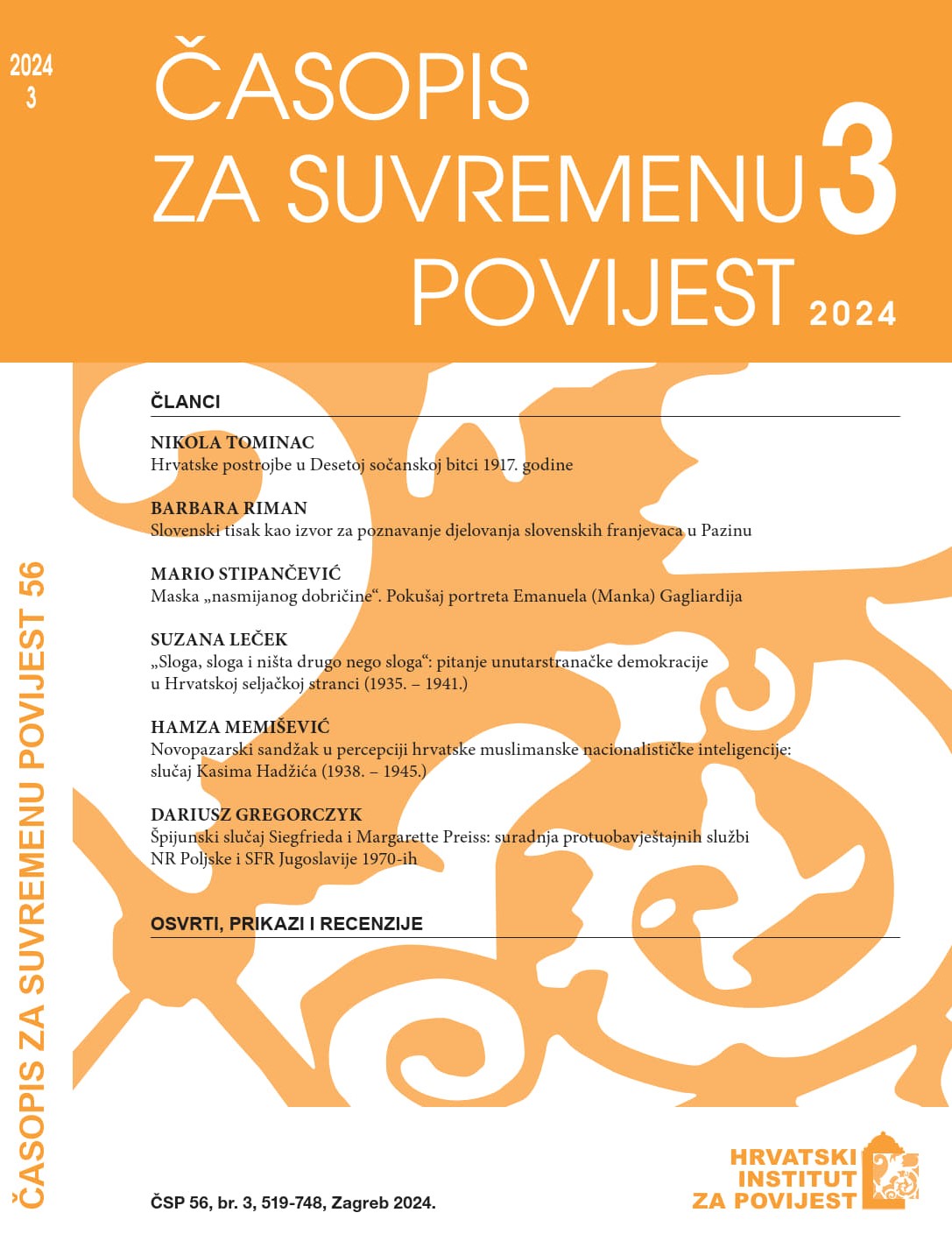„Sloga, sloga i ništa drugo nego sloga”: pitanje unutarstranačke demokracije u Hrvatskoj seljačkoj stranci (1935. – 1941.)
“Unity, Unity and Nothing but Unity”: The Issue of Intraparty Democracy in the Croatian Peasant Party (1935-1941)
Author(s): Suzana LečekSubject(s): History, Political history, Interwar Period (1920 - 1939)
Published by: Hrvatski institut za povijest
Keywords: Croatian Peasant Party; intraparty democracy; affiliated organizations; self-government;
Summary/Abstract: By the 1920s the Croatian Peasant Party had already become the first broadly based party in Croatia; during the 1930s it grew into a national movement supported by 90% of the Croatian voters. Such an atypical development was caused by state repression as well as by the well thought out programme and modern work methods of the Croatian Peasant Party. The party’s development and functioning were determined by the party operating in conditions of limited parliamentarism in the 1920s, its work being prohibited in the time of the dictatorship and by provisional renewal after 1935. In the 1920s the Croatian Peasant Party was transformed into a modern, democratically structured party. However, this changed in the 1930s when the dictatorship ended and a period of political ambivalence started – parties were not legalized, but “tolerated”. Overt activities were limited; on the one hand this strengthened the resistance and made an unusual “national concentration” possible, however, on the other hand the development into a modern party with intraparty democracy was disrupted. That is to say, the party did not revive the entire structure, and most importantly the party assembly (Central Committee) no longer existed and the local organizations were renewed only as “electoral organizations” (although they were continuously at work and not only in times of elections). Decision-making was vested in the president, Vladko Maček, and his innermost circle (the informal party leadership).The Croatian Peasant Party strove to balance out the lack of regular party bodies in other respects. The consulting procedure was strengthened and the party leadership (and most importantly Maček himself) was accessible to the people’s representatives and the representatives of the local organizations on a daily basis. Furthermore, they provided symbolic support in exchange for direct decision-making (public assemblies, party festivities). The research has also drawn attention to the significance of party cohesion and discipline, which was maintained through democratic structures (local assemblies) or by the negotiation skills of party officials. Expulsion was rare and force was not used.Furthermore, it has been explored how a relationship was established between the party and affiliated organizations that contributed to the movement’s expansion and to the interests of members achieved by bypassing the state (“parallel state”). They comprised various spheres of life and various social groups (peasants, workers, women, the young). The most significant among them were the organizations Gospodarska sloga and Seljačka sloga, the representatives of which attended district party meetings on a regular basis. Moreover, these organisations recruited experts who were, by virtue of their experience, able to take up office in the administration of the Banovina of Croatia. Finally, reference is made also to the issues addressed in self-governing bodies such as the relationship of the party with the “party in power”. The relationship between the leadership, members and those who were appointed to some office in the administration (municipalities and Banovina of Croatia) has been analysed. Attention is drawn to the close connection of municipal council (in which the Croatian Peasant Party was in the majority) with local party organizations (joint district meetings), people’s representatives and the Gospodarska sloga (Community of Municipalities of the Gospodarska sloga). In the end, certain types of communication developed by the Croatian Peasant Party and employed by the government of the Banovina of Croatia (“Open Door Days”, heads of departments attending district meetings) have been discussed. These procedures in practice made up for the lack of the usual intraparty democracy; tens of thousands were activated and started taking decisions at the local level and changing the circumstances they were living in. It is precisely this that constitutes true democracy, which does not simply come down to going to the polls, but develops into constant social activism.
Journal: Časopis za suvremenu povijest
- Issue Year: 56/2024
- Issue No: 3
- Page Range: 621-657
- Page Count: 37
- Language: English, Croatian

